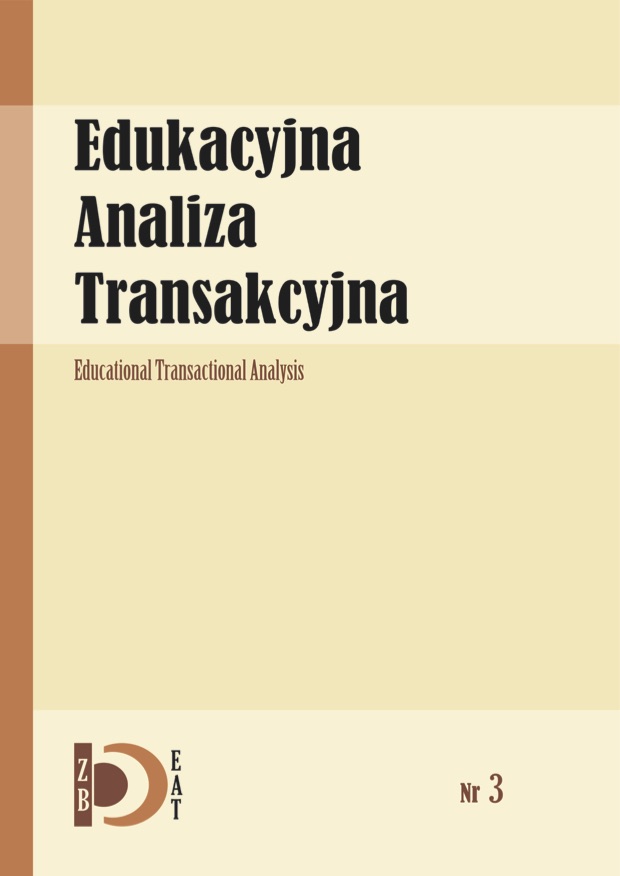Stany Ja diagnosty edukacyjnego
- Autor
-
-
Bolesław Niemierko, prof. dr hab.
-
- Słowa kluczowe:
- diagnostyka edukacyjna, diagnosta edukacyjny, edukacyjna analiza transakcyjna, stany Ja, egogram
- Abstrakt
-
Amidst the multitude of their professional obligations, teachers also function as informal educa- tional diagnosticians. This role requires maturity and the ability to shed uncontrolled inclinations which could bias diagnoses they perform. Transactional analysis may assist with such a self- recognition task.
A feasibility study on how transactional analysis can explain the differences in teachers’ con- cepts of their diagnostic duties has been carried out on a small sample of 30 post-graduate students of education. The students completed two inventories:
(1)an original set of four ten-item scales labeled: Procedural (learned by assimilation), Takinga Risk (learned by doing), Theoretician (learned by discovery), and Intuitive (learned by expe-
rience).
(2)the Egogram representing nine categories of double-level analysis, created in the ResearchGroup for Educational Transactional Analysis in Jan Długosz University in Częstochowa.
The main findings of the study include the following ones:
-
In students’ opinion, Procedural type of a diagnostician resembles mostly Adult in Adult atti-
tude and is free of the Parent in Parent authoritarian flaw.
-
The Taking a Risk diagnostician is closest to Adult in Parent, practice-oriented educator.
-
Theoreticians are also Adult in Parent personalities supported by the Parent in Adult ethical
considerations.
-
Intuitive diagnosticians are versatile, associated with all types of Parent and Adult but not with
the Childish spontaneous attitude except of certain amount of the Adult in Child’s creativity.
Much more research is needed to confirm the findings and to transfer them into acting educa-
tional evaluators: homeroom and subject-matter teachers, tutors, and supervisors.
-
- Pobrania
-
Statystyki pobrań niedostępne.
- Biogram autora
- Pobrania
- Opublikowane
- 17.12.2014
- Numer
- Nr 3 (2014)
- Dział
- Analiza transakcyjna w edukacji
- Licencja
-
OŚWIADCZENIE AUTORA:
Mam świadomość, że czasopismo jest wydawane na licencji Creative Commons - Uznanie autorstwa (https://creativecommons.org/licenses/by/4.0/legalcode).
Przesyłając artykuł wyrażam zgodę na jego udostępnienie na tej licencji
Jak cytować
Podobne artykuły
- Adrianna Sarnat-Ciastko, „Tutoring szkolny – program pedagogiki dialogu” jako profilaktyczny program rekomendowany. Założenia i zastosowanie w świetle edukacyjnej analizy transakcyjnej , Edukacyjna Analiza Transakcyjna: Nr 10 (2021)
- Jarosław Jagieła, Uczniowskie adaptacje osobowości, cz. III , Edukacyjna Analiza Transakcyjna: Nr 14 (2025)
- Joanna Grabowska, Obszary zastosowań analizy transakcyjnej. Kwerenda biblioteczna , Edukacyjna Analiza Transakcyjna: Nr 13 (2024)
- Dorota Gębuś, dr, Nakazy i zakazy rodzicielskie a kreatywność jednostki. Źródła inhibitorów twórczości w perspektywie analizy transakcyjnej , Edukacyjna Analiza Transakcyjna: Nr 5 (2016)
- Dorota Pankowska, dr hab. prof. UMCS, Dokąd zmierzamy? Uwagi o deficycie Dorosłego w edukacji i życiu społecznym , Edukacyjna Analiza Transakcyjna: Nr 6 (2017)
- Zbigniew Łęski, dr, Od redakcji , Edukacyjna Analiza Transakcyjna: Nr 7 (2018)
- Dorota Pankowska, dr hab. prof UMCS, Transakcyjne aspekty wulgaryzacji języka , Edukacyjna Analiza Transakcyjna: Nr 7 (2018)
- Trudi Newton, Od analizy transakcyjnej w edukacji do edukacyjnej analizy transakcyjnej: osobiste spotkanie , Edukacyjna Analiza Transakcyjna: Nr 5 (2016)
- Jarosław Jagieła, Student personality adaptations, part II , Edukacyjna Analiza Transakcyjna: Nr 13 (2024)
- Paulina Ratajczak, Motywacja oraz motywowanie w procesie kształcenia w ujęciu teorii analizy transakcyjnej , Edukacyjna Analiza Transakcyjna: Nr 11 (2022)
Możesz również Rozpocznij zaawansowane wyszukiwanie podobieństw dla tego artykułu.
Inne teksty tego samego autora
- Bolesław Niemierko, prof. dr hab., Analiza transakcyjna jako metoda diagnostyki edukacyjnej , Edukacyjna Analiza Transakcyjna: Nr 2 (2013)

